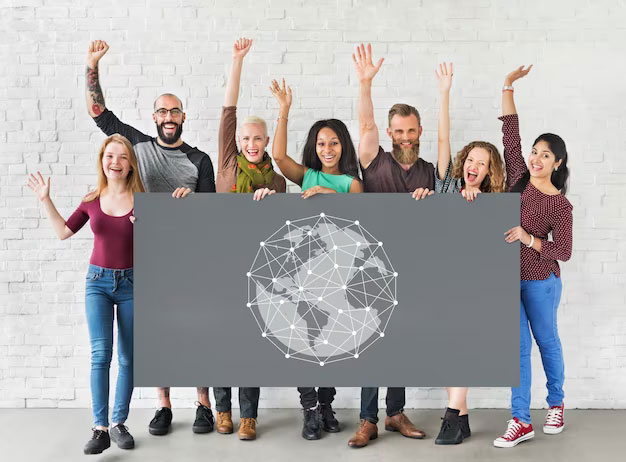Artificial Intelligence Benefits to Society: The future has finally come, and artificial intelligence (AI) is no longer a science fiction vision from sci-fi movies. The technology is fast developing and penetrating all aspects of our lives, silently transforming how people work, learn, and interact with the world. The fears surrounding the possible negative aspects of AI should not ignore all the advantages that AI has for the society. AI thrives in doing these repetitive, tiresome, and data intensive tasks.
It streamlines processes, relieving humans’ time and effort and allowing them to focus on more creative and strategic undertakings. Such as, artificial intelligence robots can perform dangerous tasks in production, artificial intelligence algorithms can examine medical scans much more accurately than people giving early diagnoses and better treatment plans.

Image Credit: Freepik.com
AI is capable of learning and adapting to make deductions that a human may overlook. This is an important factor that helps to achieve results at different levels, ranging from scientific research to product development. AI can examine large data sets predicting weather changes, optimizing the use of energy and even designing special materials.
Also See: Benefits of AI (Artificial Intelligence) in Cyber Security
Artificial Intelligence Benefits to Society: AI Contribution
Healthcare:
- Early disease detection: AI algorithms can analyze medical scans and data to identify diseases like cancer at earlier stages, leading to improved treatment outcomes.
- Personalized medicine: AI can tailor treatment plans to individual patients based on their unique genetic makeup and medical history.
- Drug discovery and development: AI is accelerating the process of discovering and developing new drugs and vaccines.
- Virtual assistants for patients: AI-powered chatbots and virtual assistants can provide patients with 24/7 medical information and support.
- Robotic surgery: AI-assisted robots are performing minimally invasive surgeries with greater precision and efficiency.
Education:
- Personalized learning: AI can personalize learning paths for each student, adapting to their individual needs and learning styles.
- Automated grading: AI can grade essays and tests, freeing up teachers’ time for more one-on-one interaction with students.
- Virtual tutors and learning companions: AI-powered tutors and companions can provide students with additional support and guidance outside the classroom.
- Language learning: AI-powered language learning apps are making it easier and more effective for people to learn new languages.
- Accessibility tools: AI can create tools that make education more accessible for people with disabilities.
Environment:
- Predicting and mitigating natural disasters: AI can analyze weather data and other factors to predict and mitigate natural disasters like floods and wildfires.
- Monitoring environmental changes: AI can monitor deforestation, pollution levels, and other environmental changes in real-time.
- Developing sustainable energy solutions: AI is helping to develop more efficient and sustainable energy sources like solar and wind power.
- Precision agriculture: AI can optimize crop yields and water usage, reducing the environmental impact of agriculture.
- Protecting endangered species: AI can be used to track and protect endangered species from poachers and habitat loss.
Business and Economy:
- Automating tasks: AI can automate repetitive tasks, freeing up human workers for more creative and strategic work.
- Improving customer service: AI-powered chatbots and virtual assistants can provide 24/7 customer service and support.
- Fraud detection and prevention: AI can detect fraudulent activity in real-time, protecting businesses from financial losses.
- Market research and analysis: AI can analyze large datasets to provide valuable insights for businesses to make informed decisions.
- Supply chain optimization: AI can optimize supply chains to improve efficiency and reduce costs.
Transportation and Infrastructure:
- Self-driving cars: AI is making self-driving cars a reality, which could revolutionize transportation and make roads safer.
- Traffic management: AI can optimize traffic flow and reduce congestion.
- Predictive maintenance: AI can predict when infrastructure is likely to fail, allowing for preventative maintenance and avoiding costly repairs.
- Smart cities: AI is being used to develop smart cities that are more efficient, sustainable, and livable.
- Accessibility in transportation: AI can be used to develop new technologies that make transportation more accessible for people with disabilities.
Other Benefits:
- Scientific research: AI is accelerating scientific research in fields like biology, physics, and astronomy.
- Space exploration: AI is playing a key role in space exploration, from designing spacecraft to analyzing data from Mars rovers.
- Art and music creation: AI is being used to create new forms of art and music.
- Disaster relief: AI is being used to coordinate disaster relief efforts and provide support to victims.
- Entertainment: AI is being used to create more immersive and personalized entertainment experiences.
Artificial intelligence (AI) is rapidly transforming our world, weaving its intricate threads into the fabric of society and enriching our lives in countless ways. From healthcare to transportation, education to entertainment, AI is no longer a futuristic fantasy; it’s the present, shaping a future filled with remarkable possibilities.
Remember, AI is a tool, and like any tool, its impact depends on the hands that wield it. Let’s choose to use AI wisely, shaping a future where technology empowers us, uplifts us, and ultimately, benefits all of humanity.
So it was all about 31+ Artificial Intelligence Benefits to Society, if you liked our article then please share this with your friends and dear ones.